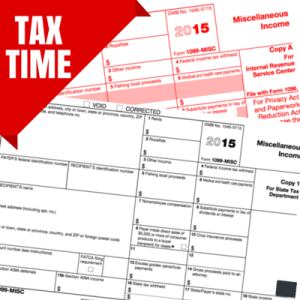IT’S TAX SEASON!
Somehow that doesn’t have quite the same ring as, “It’s the holiday season,” now does it? But I don’t think it has to be THAT horrible, especially if you get started now.
Here are my top 5 tips for getting through tax season without resorting to tantrums, hair-pulling, and nail-chewing:
- Start Now: As in, grab that box where you’ve got your papers, receipts, folders, etc. and start sorting: regular monthly expenses, travel expenses, meals, entertainment, gas mileage, etc. What? You have no such box? Ok. Deep breath. You can do this. Start gathering all the receipts and paperwork that’s hiding in your wallet, your desk, your computer, wherever you can think of having shoved it all and start sorting. This is important. Of course, if you’ve got it all neatly organized in a program, or a filing system, kudos to you. I’d suggest going in and reviewing what’s in there (unless you’ve already done that too, then you’re a rockstar–tax season is a piece of cake for you).
- Don’t mess with the IRS. In fact… take a whole different approach. The IRS isn’t actually there to scare you. Yes, there are rules and regulations to follow, but there are also ways to be incentivized by those rules and regulations; For example, there are many ways you can take advantage of home office deductions. Even though the IRS came out with a new simplified home office deduction of $5 per square foot (with a max limit of $1,500 for 300 square feet of home office space), with a good accountant you could very well deduct a whole lot more using the traditional method of claiming home office expenses; a good accountant will know which method is in your best interests. And one more thing: make sure the area you’re claiming to be a “home office” is clearly defined. Your kitchen table area, or a corner of the house that also doubles as the kids’ play area, doesn’t count. Sorry.
 Hire a good accountant/tax professional: You may not want to incur the expense of a hot-shot accountant, but a good one will pay for herself. The tax code is dense, and trying to do it yourself could cost you money. Be sure to ask your accountant for a thorough explanation of the deductions and make sure to inquire about the best method for you to calculate your home office deductions (see # 2, above).
Hire a good accountant/tax professional: You may not want to incur the expense of a hot-shot accountant, but a good one will pay for herself. The tax code is dense, and trying to do it yourself could cost you money. Be sure to ask your accountant for a thorough explanation of the deductions and make sure to inquire about the best method for you to calculate your home office deductions (see # 2, above).- Don’t forget your start-up costs: Even though you may not have been making money while you were getting your business off the ground, that doesn’t mean those expenses aren’t deductible. As soon as you start making money you can claim your start-up costs. You’re able to deduct up to $5000 in the first year and amortize the rest over the next fifteen years, as long as you have the records to prove it. That’s why it’s so important to keep impeccable records.
- Keep impeccable records: The sooner you start to keep a good set of books, the more relaxed you’ll feel come tax season. Keep a log book for your car expenses and mileage (this makes the IRS very happy), a monthly accounting of recurring expenses and an organized place to keep your receipts. Don’t simply rely on your credit card statements because they don’t show what you bought, only that you bought something. Maybe it was a computer, maybe it wasn’t. The IRS wants proof that what you say you bought is what you actually bought.
Of course, this list isn’t exhaustive, but it’s a good start. Organization is key, along with having an accountant that you trust will squeeze every last drop out of the tax code so that you benefit.
Also, work with your accountant to establish a system that will help you keep track of money coming in and money going out, and what to do with the excess; After all, your accountant isn’t just a glorified calculator… he or she can help you strategize ways that will not only save money but also how to invest your business earnings.
 Are you shaking your head and saying, “I had no idea about any of this?”
Are you shaking your head and saying, “I had no idea about any of this?”
That’s why you need the DIY Legal Toolkit; it’s loaded, and I mean loaded with plain-English-legal information like this specifically for online entrepreneurs.
The best part? There’s no “legal fee aftertaste” because the toolkit costs what you’d spend hiring a good Internet lawyer (and good Internet lawyers are hard to come by) for only one hour.
Find out more about the DIY Legal Toolkit HERE and cover your assets online!
